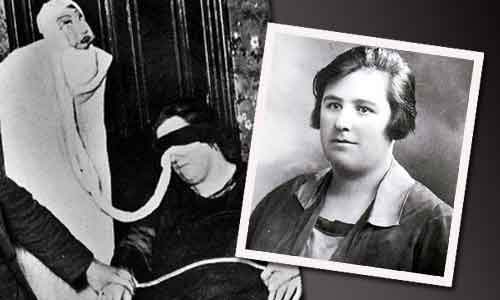Helen Duncan (1897-1956) was the last person to be imprisoned under the British Witchcraft Act 1735. We looked at how this psychic medium raised the ire of the British Government during World War 2.
Who was Helen Duncan?
Helen Duncan was one of the most controversial psychics of all time.
Victoria Helen Duncan was born in Callander, Perthshire, Scotland on 25 November 1897. From an early age she would alarm her family and those around her with prophecies. After leaving school she met a cabinet maker named Henry Duncan, who was supportive of her psychic abilities and they eventually had six children.
In the late 1920s, Helen Duncan became offering seances where she claimed she could to help the spirits of recently dead relatives of customers to materialise. She did this by emitting ectoplasm from her mouth. This aspect of Helen Duncan’s psychic ability is the most controversial with some, such as paranormal investigator Harry Price, suggesting the ectoplasm was really just cheesecloth.
During World War 2, in November 1941, Duncan performed a seance in Portsmouth. It was here that she claimed the spirit of a sailor told her the HMS Barham had been sunk. Wartime censorship meant the catastrophe was known only to relatives of the casualties, so the authorities were particularly alarmed at Helen Duncan’s “inside” knowledge. The authorities’ biggest fear was not of Duncan’s connection to the “other side” but that she might reveal military secrets.
The séance lead to the Scots-born spiritualist being charged under section 4 of the Witchcraft Act 1735 for fraudulent activity. She was also charged under the Larceny Act for taking money “by falsely pretending that she was in a position to bring about the appearances of the spirits of deceased persons”.
An interesting misconception about the case is noted on a BBC website: “… the Witchcraft Act was originally formulated to eradicate the belief in witches and its introduction meant that from 1735 onwards an individual could no longer be tried as a witch in England or Scotland. However, they could be fined or imprisoned for purporting to have the powers of a witch.”

The Old Bailey jury trial caused a stir in wartime London and attracted much media attention. During the trial Duncan was barred from demonstrating her power as part of her defence against the Larceny charges. She was eventually found guilty under the Witchcraft Act (but not guilty of charges under the Larceny Act) and sentenced to nine months in Holloway Prison.
After the trial, Prime Minister Winston Churchill complained to the Home Secretary Herbert Morrison about the “obsolete tomfoolery” of the charge and waste of court resources.
On her release in 1945, Duncan promised to stop holding seances. However, she was arrested doing it again in 1956. She died in her Edinburgh home shortly afterwards, on the 6 December 1956.
Duncan was the last person in Britain to be jailed under the act, which was repealed in 1951 and replaced with the Fraudulent Mediums Act. Duncan’s family and supporters have campaigned over the years to have her posthumously pardoned of witchcraft charges. However, these have all been rejected.
However, Duncan was not the last person convicted under the Witchcraft Act. Jane Rebecca Yorke received a lenient sentence due to her age (she was in her 70s) and fined in late 1944.


i think that i should tell use more info becasuse i am using it for a gcse help
again ignorant foolish humans